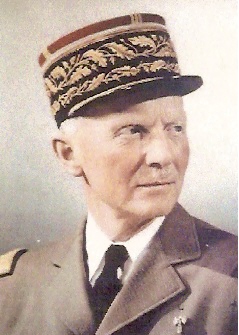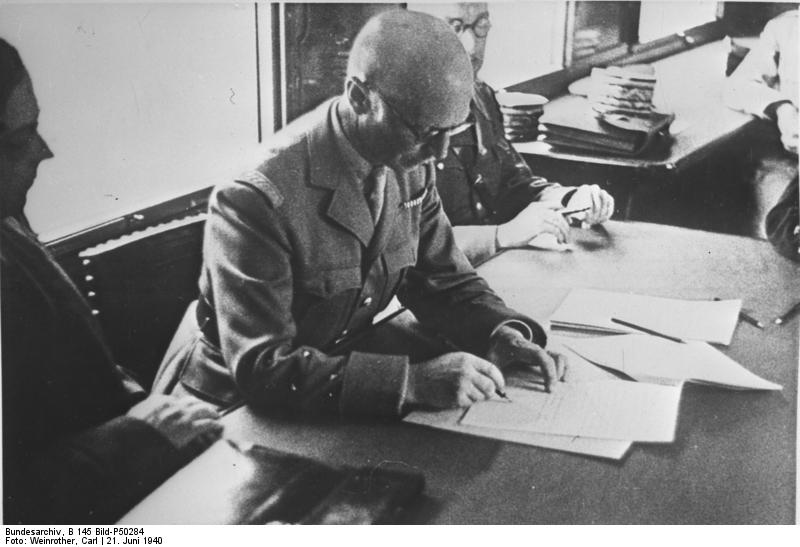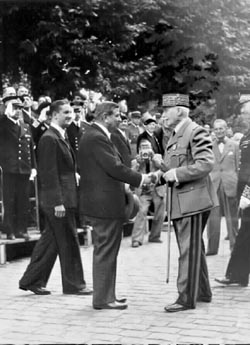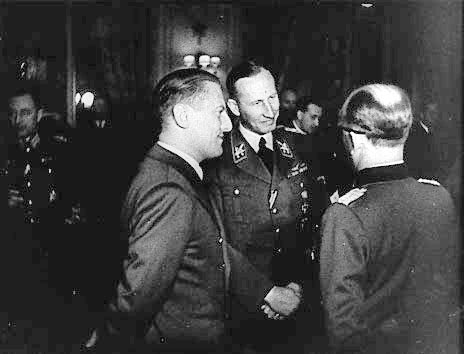<Back to Index>
- Minister of Defense General Charles Huntziger, 1880
- General Secretary to Police René Bousquet, 1909
- Deputy Secretary to Police Jean Leguay, 1909
PAGE SPONSOR


Charles Huntziger (25 June 1880 – 11 November 1941) was a French Army general during World War I and World War II.
Born at Lesneven (Finistère), he graduated from Saint - Cyr in 1900 and joined the colonial infantry. During World War I he served in the Middle Eastern theater. He was chief of staff of operations of the Allied Expeditionary Force. In 1918 he participated in the development of General Louis Franchet d'Espèrey's offensive against German and Bulgarian forces which would lead to Allied victory and the signing of the Armistice of Mudros in October 1918.
In 1933, Huntziger was named commander - in - chief of the troops of the Levant. He then participated in the negotiations around the reattachment of the Sanjak of Alexandretta, then part of the French Mandate of Syria, to Turkey. He joined the Superior Council of War in 1938.
During World War II, in 1939 – 1940, he initially commanded the Second French Army, then the Fourth Army Group in the Ardennes. He fought in the Battle of France with the Second Army. On 16 June 1940 Premier Philippe Pétain's new Cabinet decided upon an Armistice, and the following day Paul Baudouin, Minister of Foreign Affairs, requested the Spanish Ambassador "to transmit to Germany with all speed the request to cease hostilities at once and at the same time to make known the peace terms proposed by them". On the morning of 19 June Lequerica reported to Baudouin that the Germans were prepared to talk and the following day he was further advised that the Germans were prepared to meet the French plenipotentiaries later that day at Tours. The armistice negotiations were led, on the French side, by Huntziger. The Council of Ministers met during the night of 21 June in Bordeaux to consider the terms. The Armistice was agreed, to come into effect at 12.35 on the morning of 25 June.
After the armistice, Huntziger became the French Government's Secretary of War, then commander - in - chief of the land forces (September 1941). He was one of the signatories of the anti - Semitic Statute on Jews of 3 October 1940 (excluding nine Jewish generals from the army) alongside Philippe Pétain, Pierre Laval, Raphaël Alibert, Marcel Peyrouton, Paul Baudouin, Yves Bouthillier and François Darlan.
He died on 11 November 1941 after his plane crashed near Le Vigan, Gard, while trying to land at Vichy Airport in bad visibility, and with obsolete radio equipment, as he returned from an inspection in North Africa. His funeral took place on 15 November 1941 at the cathedral of Vichy.
His widow was the first receiver of the Order of the Francisque.


René Bousquet (11 May 1909 – 8 June 1993) was a high ranking French political appointee who served as secretary general to the Vichy regime police from May 1942 to 31 December 1943. For personal heroism, he had become a protégé of prominent officials before the war and rose rapidly in the government.
In the postwar years, he was automatically convicted as a Vichy official and sentenced to five years, but his sentence was reduced due to beliefs that he also aided the Resistance and attempted to preserve some autonomy for French police during the Nazi Occupation. Excluded from the government, he went into business. After receiving amnesty in 1959, Bousquet became active again in politics, supporting left wing politicians through the 1970s, and becoming a regular visitor of François Mitterrand after his election as president in the 1980s.
After years of increasing accusations about his activities during the war, in 1989 Bousquet was accused by three groups of crimes against humanity. He was ultimately indicted by Justice in 1991 for his decisions during the Vel' d'Hiv Roundup in 1942, which led to more underage Jewish children being deported to extermination camps and death in eastern Europe. Bousquet was assassinated in 1993 by Christian Didier shortly before his trial was to begin.
René Bousquet was born to a radical socialist notary in Montauban, Tarn - et - Garonne. After law studies, he began his career as chief of the cabinet of the préfet for Tarn - et - Garonne.
In March 1930, he and a friend became national heroes after they personally saved dozens of people from drowning during floods in the southwest of France. He was awarded the Legion of Honor and the Médaille d'or des belles actions ("Golden medal for fine deeds"). Maurice Sarraut, the radical socialist senator and CEO of La Dépêche du Midi, and Albert Sarraut, deputy, president of the Council and minister, took on Bousquet as their protégé. Bousquet was detached to the Presidency of the Council to head the technical service in charge of the reconstruction of the flooded Southern regions. He had a rapid rise within the government, gaining increasingly responsible appointments.
At the age of 22, he became second of the cabinet of Pierre Cathala, then minister of the Interior. In 1933, Bousquet was promoted to sous - préfet, and in 1935, he was appointed as general director of the national cabinet of the Minister for Agriculture. The next year, Bousquet was given responsibility for the central files of the National Security.
In April 1938, Albert Sarraut, then Minister of the Interior, named him sous - préfet for Vitry - le - François (Marne). In 1939, he became general secretary of the préfecture for Châlons - sur - Marne (now Châlons - en - Champagne).
In 1940 Bousquet was appointed as préfet after the Armistice, in which France surrendered to Germany and agreed to occupation.
In September 1941, he was appointed as the youngest regional préfet. Because of his radical - socialist background, he was subject to the hatred of Je suis partout. He helped some war prisoners to escape, and worked to lighten the economic toll of the Nazi occupation on the Marne department.
In 1942, Admiral François Darlan offered him the Ministry of Agriculture, which Bousquet twice refused.
In April 1942, as the Schutzstaffel (SS) was taking over security duties in the Occupied Zone, Pierre Laval appointed Bousquet general secretary to Police. Bousquet was given permanent credentials to sign on behalf of the head of State.
SS Carl Oberg was in charge of the German Police in France. Bousquet worked with him and obtained some autonomy for the French police by promising to collaborate with the Germans. Bousquet concentrated all police services under his personal authority, suppressing the branch led by Darquier de Pellepoix, general commissary of Jewish affairs.
Bousquet negotiated the "Oberg - Bousquet" deal, which was presented to all regional préfets on 8 August 1942. It formally recognized the autonomy of the French police and Gendarmerie and said that the French police would not be compelled to provide hostages, nor to hand their prisoners over to German services. But three days later, the Germans demanded the French provide 70 hostages in retaliation for the murder of eight Germans.
On 2 July 1942, Bousquet and Oberg prepared the arrests known as the Vel' d'Hiv Roundup (Rafle du Vel' d'Hiv), which rounded up French and foreign Jews for deportation. Bousquet personally canceled orders protecting some categories of people from arrests, notably children under 18 and parents with children under 5. After the arrests, some bishops and cardinals protested; Bousquet threatened to cancel tax privileges for Catholic schools.
Under the pretext of not separating families, the premier Pierre Laval ordered that Jewish children under 16 be included in deportation convoys, thus surpassing the requirements of the Nazis. Bousquet obliged and expanded the deportation to parents and their children under 2 years. In the events, children were separated from their parents and deported in different groups.
In January 1943, Bousquet aided Oberg in the organization and execution of a massive raid in Marseille, known as the Battle of Marseille. The French police assisted the German police in expelling 30,000 people from the Old Port. They subsequently destroyed the neighborhood, which the German police considered a "terrorist nest" because of its many winding, small streets. Bousquet offered his services for this operation. As the French police controlled the documentation of identity for 40,000 people. With their review assistance, the operation sent 2,000 Jewish Marseillaises to the extermination camps.
For this occasion, SS Oberg, in charge of the German Police in France, came from Paris to supervise. He gave Bousquet orders directly received from Himmler. It is a notable case of the French police's willing collaboration with the Nazis.
In April 1943, Bousquet met with Heinrich Himmler. Himmler declared himself "impressed by Bousquet's personality", mentioning him as a "precious collaborator in the framework of police collaboration".
At the time, Bousquet was also councilor to Pierre Laval, along with Jean Jardin and Charles Rochat. Bousquet was controversial and became resented by his fellow collaborationists and competitors for power, such as Joseph Barthélémy, minister of Justice.
On 2 December 1943, men of the Milice, the French Secret Police, assassinated Maurice Sarraut. Bousquet was set to arrest the attackers, and the Milice asked Berlin to get Bousquet removed. After ordering releases and destroying his archives, Bousquet resigned on the 31 December 1943. He was replaced by Joseph Darnand, leader of the Milice.
Put in the reserve of the civil corps, Bousquet was under surveillance for nearly two weeks in a villa in Neuilly. He drove to Germany in a car lent by Carl Oberg.
During early 1944, the collaborationist press, such as Je suis partout, attacked Bousquet, accusing him of having served in the Vichy administration only to favor the Resistance. His cabinet director, Jean - Paul Martin, was reported to have also helped some Resistance networks.
Bousquet was in Bavaria at the time of the German surrender. He returned to France with the status of a "deported person". He met with Laval to help him prepare for his trial. Convicted of collaboration, Laval was sentenced to death. Bousquet spent part of the night with him before Laval's execution.
In 1949 René Bousquet was the last Frenchman to be tried by the Haute Cour. He was acquitted of the charge of "compromising the interests of the National defense", but was automatically declared guilty of indignité nationale for his involvement in the government of Vichy. He was given the minimal sentence of five years of dégradation nationale, a measure immediately lifted for "having actively and sustainably participated in the Resistance against the occupier".
As with other Vichy officials, Bousquet was excluded from the French public service. He made a career at the Banque de l'Indochine and in newspapers. He met with François Mitterrand through Jean - Paul Martin, Bousquet's former collaborator in Vichy. At the time, Martin was minister of overseas territories and director of Miterrand's cabinet.
In 1957, the Conseil d'État returned his Legion of Honor to Bousquet, and he received amnesty on 17 January 1958.
In the legislative elections of 1958, Bousquet ran as a candidate for the 3rd circonscription of the Marne. He was supported by the Democratic and Socialist Union of the Resistance; his second was Hector Bouilly, a radical - socialist general councilor. Bousquet earned less than 10% of the votes.
After Jean Baylet's death in 1959, Bousquet was appointed to the Council of administration of the newspaper La Dépêche du Midi. He supported the candidacy of Mitterrand in 1965, and observed an anti - Gaullist editorial line. After Bousquet quit in 1971, the tone of the newspaper softened.
In 1974, Bousquet supported and helped finance Mitterrand against Valéry Giscard d'Estaing. Bousquet was acquainted with numerous other political and cultural figures, such as Antoine Pinay, Bernard Cornut - Gentille, Jacques Chaban - Delmas, the composer Edgar Faure and Maurice Faure. He was part of the administration council of UTA.
After Mitterrand's election in the presidential election in 1981, Bousquet occasionally met him at the Élysée to "talk about politics". In 1986, he and Mitterrand stopped seeing each other, as opposition groups accused Bousquet of crimes against humanity during WWII.
The parquet général de Paris closed Bousquet's case by sending it to a Court which was no longer in existence. This stirred outrage; attorneys for the International Federation of Human Rights declared that there was a "political decision at the highest levels to prevent the Bousquet affair from developing".
In 1989, Serge Klarsfeld and his Association des fils et filles des déportés juifs de France (Sons and daughters of Jewish Deportees from France), the National Federation of deportees and internees, Resistants and Patriots and the Ligue des droits de l'homme filled a complaint against Bousquet for crime against humanity, for the deportation of 194 young children from Paris. In 1991, Bousquet was indicted by the national government. By 1995, only four senior French Vichy officials had been indicted for war crimes, and by 1995, only Paul Touvier had stood trial. The former Vichy official Maurice Papon was convicted of war crimes in 1998.
On 8 June 1993, a few weeks before his trial was to begin, Bousquet was shot dead by the 51 year old Christian Didier, who pled not guilty, as he claimed the execution was justified by Bousquet's wartime crimes. With a history of pursuing former Vichy officials, Didier held a press conference to announce his murder of a "monster". He was defended by Thierry Levy and Arnaud Montebourg. Didier was ruled sane although the court heard testimony about his mental problems; he was convicted of the slaying and sentenced to ten years in prison.
Jean Leguay (29 November 1909 - 5 July 1989) was second in command in the French National Police during the Nazi Occupation of France. He was complicit in the 1942 roundup of Jews in Paris and their deportation from France to Nazi extermination camps, which resulted in the deaths of thousands of people, both adults and children.
During the Vichy regime, Leguay was second - in - command to René Bousquet, general secretary of the National Police in Paris. He participated in organizing the Vel' d'Hiv Roundup (Rafle du Vel' d'Hiv), the mass arrest of more than 13,000 Jews which took place on 16 and 17 July 1942 in Paris. They were deported to extermination camps in eastern Europe, where most were killed.
After the war, Leguay became president of Warner Lambert, Inc. of London. (It is now merged with Pfizer.) Later he became president of Substantia Laboratories in Paris.
In 1979 Leguay was charged with crimes against humanity for his role in the organization of the Vel' d'Hiv Roundup (Rafle du Vel' d'Hiv), the mass arrest of more than 13,000 Jews on 16 and 17 July 1942 in Paris.
Leguay killed himself in 1989 without yet having been tried. In a statement unprecedented in the history of French justice, the judiciary officially stated after his death that Leguay's involvement in crimes against humanity was ascertained beyond any doubt.